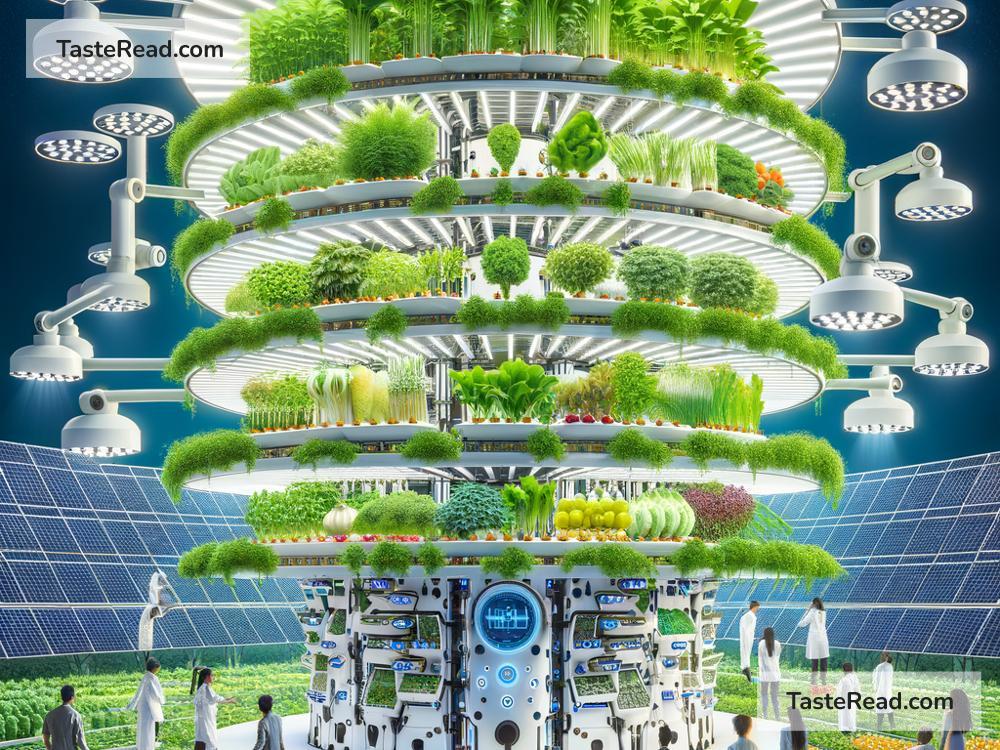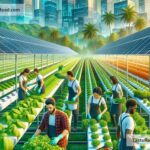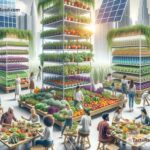The Future of Food and Equitable Access
Food is something we all need to survive. It keeps us healthy, gives us energy, and helps us grow. But food isn’t just about survival; it’s also about enjoyment, culture, and community. Unfortunately, not everyone has enough food to eat or the same access to healthy choices. As we look to the future, we need to think about how the world can produce enough food for everyone and make it fair so that all people, no matter where they live, can enjoy good, nutritious food.
What is the future of food?
The future of food is a big topic with lots of possibilities. Scientists, farmers, and food experts are working together to find new solutions to feed everyone on Earth. Here are some big ideas that could shape the future of food:
1. Technology in farming
In the future, we will likely see more advanced technology in farming. Robots may help plant seeds, harvest crops, and monitor plants’ health. Drones could fly over fields, spraying water or fertilizer exactly where it’s needed. Smart farming tools can tell farmers if the soil is healthy or warn them about pests before they cause harm. This technology can help farms grow more food using fewer resources like water and land.
2. Vertical farming and controlled environments
Land is limited, especially in cities where many people live. Vertical farming offers a solution by growing crops indoors in tall buildings or stacked layers. These farms use LED lights to mimic sunlight and hydroponics to grow plants in water instead of soil. Controlled environments are also great because they protect plants from bad weather, pests, and diseases, allowing food to grow all year long.
3. Alternative proteins
As the global population grows, we’ll need more protein to feed people. Some experts believe the future of food will include alternatives to traditional meat, like lab-grown meat or plant-based proteins made from soy, peas, and beans. These options are better for the environment since they use fewer resources and produce less pollution than raising animals for meat. Other exciting protein sources include insects, which are nutritious and already eaten in many cultures.
4. Environmentally friendly foods
The future of food will focus on sustainability—making sure we can feed people without harming the planet. Right now, farming can lead to problems like deforestation and pollution. To fix this, scientists are exploring ways to grow foods that are better for the environment, such as drought-resistant crops or foods that need less fertilizer. Reducing food waste is also important, so new methods like smart packaging that keeps food fresh longer are being developed.
5. Personalized nutrition
In the future, food might become more personalized. Imagine scientists using information about your body, like your DNA and health history, to create diets just for you. For example, if you have low energy, they might suggest eating certain foods to boost it. This would help people live healthier lives and avoid sicknesses caused by eating the wrong kinds of foods.
Equitable access to food
The future of food technology sounds exciting, but what about the people who don’t have enough food today? Right now, millions of people around the world struggle with hunger. Many others eat unhealthy food because they can’t afford fresh fruits and vegetables or they live in areas where these foods aren’t easily available. The idea of “equitable access” means making sure everyone, everywhere, has access to enough healthy, nutritious food, no matter their income or location.
1. Breaking barriers in food access
Hunger and unequal food access are caused by problems like poverty, lack of infrastructure, and climate change. To create a fair system, governments and organizations are working on creative solutions to bring food to communities in need. For example:
– Food banks and community gardens can provide free food to people who can’t afford it.
– Improved transportation systems can help farmers deliver fresh food to cities faster.
– Mobile food markets and apps are being created to make shopping for affordable food easier.
2. Supporting small farmers
Big food companies often dominate the market, making it hard for small farmers to succeed. Yet these small farmers are essential for feeding local communities. Governments and organizations can support small-scale farms by giving them better equipment, fair prices for their crops, and training to use modern farming techniques. This ensures that more people have access to fresh, locally-grown food.
3. Education about food and nutrition
Education is also key to equitable access to food. When people understand the importance of good nutrition, they can make better choices for themselves and their families. Schools can teach children how to grow their own food, cook healthy meals, and avoid processed junk food. Communities can host workshops to show people how to eat well, even on a tight budget.
4. Solving global food inequality
Around the world, some countries have more food than they need, while others don’t have enough. Sharing resources between countries can make food access fairer. For instance, wealthier nations can donate food, money, or technology to poorer countries. International groups can also work together to address challenges like droughts or floods that ruin crops in struggling regions.
A hopeful vision for the future
The future of food isn’t just about producing more—it’s about making sure everyone gets their fair share. Smart farming technology, alternative proteins, and sustainable practices will help feed a growing population while protecting the planet. Meanwhile, efforts to address hunger, support small farmers, and educate people on nutrition will bring us closer to a world where no one goes to bed hungry.
It’s an exciting and important challenge. As individuals, we can help by wasting less food, donating to food charities, and learning about nutrition. Together, we can build a brighter future where everyone has access to fresh, healthy, and delicious food—no matter who they are or where they live.


